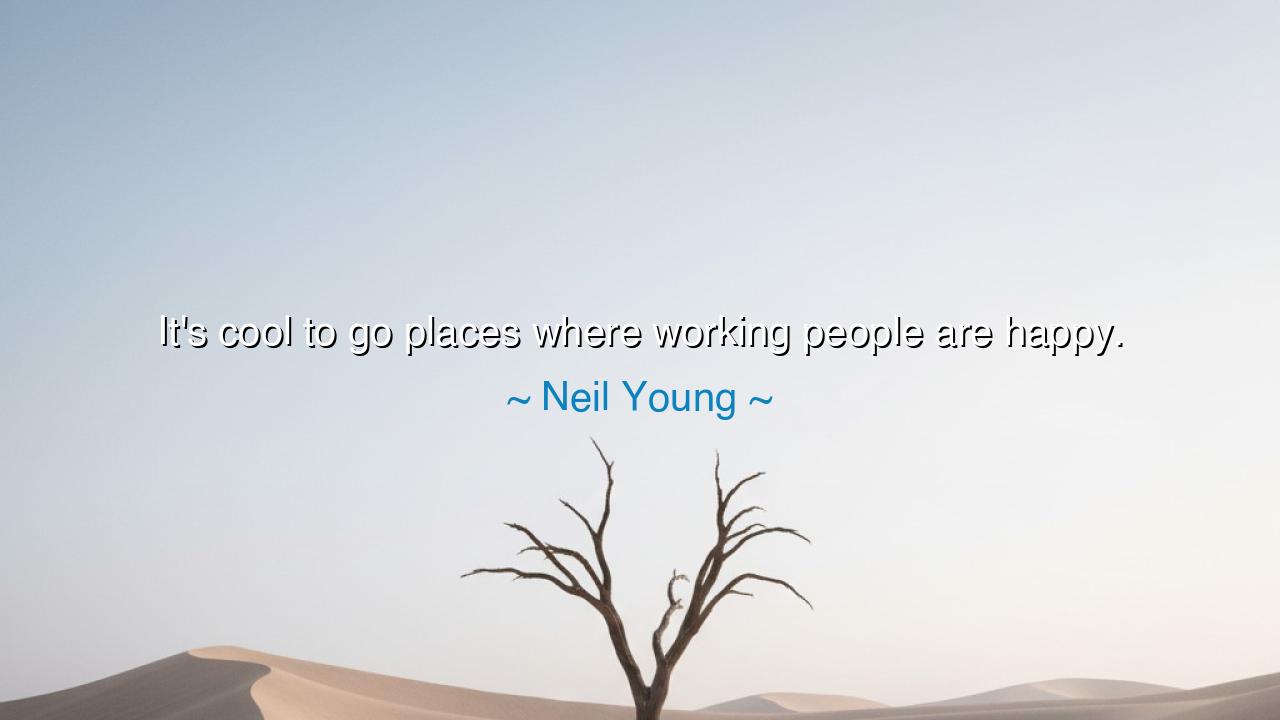
It's cool to go places where working people are happy.






"It's cool to go places where working people are happy." These words by Neil Young carry a profound message about the true value of happiness and fulfillment, which can often be found in the most humble of settings. The notion of “working people” being happy may seem simple, yet it reflects a deep truth: true happiness is not necessarily found in wealth, prestige, or luxury, but in the satisfaction of hard work, community, and purpose. It is in these places, where individuals engage in meaningful labor, that the spirit of joy and contentment can often be most fully realized. Young’s words remind us that contentment does not require excess but rather a deep alignment with one’s work and surroundings.
Throughout the ages, the relationship between labor and happiness has been a subject of great reflection. In the ancient Greek tradition, Aristotle argued that the best life is one of virtuous activity, where work is not simply a means of survival but a way of expressing one’s true self. For Aristotle, happiness—eudaimonia—was achieved through the fulfillment of our potential in the world, not by indulgence but by doing work that aligns with our values. Similarly, the Romans believed in the virtue of labor, with figures like Cicero extolling the dignity of honest work as a path to inner peace. In these societies, working people were revered not for their wealth or status, but for their contribution to the greater good, and their happiness was found in the meaningfulness of their labor.
Consider the example of the builders of the ancient pyramids in Egypt. Though they labored under harsh conditions, these workers did not labor in vain, but rather with a shared purpose—to create something that would stand the test of time, to leave behind a legacy that would last for generations. It is said that these workers were often provided with rations, care, and even respect for the spiritual significance of their work. They may not have been wealthy in material terms, but they were rich in purpose, and in their hearts, they understood that their labor was meaningful. It is in such places, where the fruits of one’s sweat are tied to something greater than oneself, that happiness is not only possible but often thrives.
In the modern era, Neil Young’s quote speaks to the value of simplicity and authenticity in happiness. In a world that often places the pursuit of wealth and status at the forefront, the idea that true happiness can be found in working people, who do not seek riches but are content in their daily toil, is both radical and refreshing. Take, for example, the farmers in rural America during the Great Depression. Despite facing extreme hardship, many found solace in the community spirit and the satisfaction of tending to the land, providing for their families, and taking pride in the work they did. Their joy was not born from abundance, but from the knowledge that their work had purpose, that it supported their families, and that it connected them to something larger than themselves. In such places, happiness was woven into the very fabric of daily life.
This idea can be seen in countless other cultures where the value of hard work is celebrated, and where happiness is found not in what is acquired, but in how work is approached. In Japanese culture, for example, the concept of Ikigai—finding purpose and joy in one’s work—has long been a central tenet of the national identity. The Japanese view work as an opportunity for personal fulfillment, and the joy of contributing to one’s community is considered a profound source of happiness. It is not the material reward, but the meaning and community found in labor that leads to happiness. Neil Young’s words, therefore, are not just an acknowledgment of the simple life, but a call to recognize the deeper value of purposeful work.
The lesson that Neil Young offers is one that calls us to shift our focus from the superficial markers of success—such as wealth, status, or fame—and to find meaning in the work we do, no matter how humble it may seem. It is not the job that determines happiness, but the attitude we bring to it. Working people, as Young highlights, often find happiness because they are grounded in something that transcends the temporary and the material. They find purpose in their labor, satisfaction in their contribution to the world, and connection to the people around them.
Thus, let us seek to cultivate a life where work becomes a vehicle for happiness, not just a means to an end. Whether we labor with our hands, our minds, or our hearts, let us approach our work with intention, seeing it as an opportunity to contribute, to grow, and to find fulfillment. Let us take inspiration from the places where working people are happy—not because their lives are without struggle, but because their work gives them meaning, and that is where true happiness lies.






AAdministratorAdministrator
Welcome, honored guests. Please leave a comment, we will respond soon